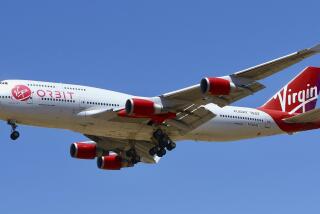Raytheon Acquires Hughes Wing in $9.5-Billion Deal
- Share via
The defense operations of Hughes Electronics Corp., long a symbol of Southern California’s dominance of the U.S. aerospace industry, will be acquired by East Coast rival Raytheon Corp. in a proposed $9.5-billion deal that may be the final mega-merger in defense, the firms announced Thursday.
General Motors Corp., which owns Hughes, chose Raytheon’s offer over a rival proposal from Northrop Grumman Corp., a Los Angeles defense company that badly sought Hughes’ defense assets to help guarantee its leadership role in the industry.
The Hughes sale marks another painful step in Southern California’s loss of influence in the U.S. aerospace industry. At one time, half a dozen major aerospace firms were headquartered in Los Angeles; today only Northrop Grumman remains.
Raytheon executives also raised the prospect that more aerospace layoffs may be coming in the aftermath of the Hughes purchase.
The Hughes deal will lift Raytheon, based in Lexington, Mass., into the top tier of defense companies behind Boeing Co. and Lockheed Martin Corp. The Hughes assets will expand Raytheon’s annual sales to about $21 billion, with $13 billion coming from defense.
The sale of Hughes’ defense group--which carries the venerable Hughes Aircraft Co. name and dates back five decades to its development by the late billionaire Howard Hughes--also likely marks the last of several giant marriages among defense contractors in recent years.
The companies have been furiously merging to adapt to massive post-Cold War cuts in Pentagon weapons spending, and Hughes was one of the last major players still standing. Just a month ago, Boeing agreed to buy McDonnell Douglas Corp. for $13.3 billion in the biggest aerospace merger in history.
The Raytheon merger “represents the best opportunity for Hughes’ defense business to remain a competitive participant in the industry,” GM Chairman John F. Smith Jr. said at a press conference in New York.
Only weeks ago, Raytheon also outbid Northrop Grumman for Texas Instrument Inc.’s defense operations. Northrop Grumman’s back-to-back losses resurrected questions about whether Northrop Grumman has the size and clout to remain a defense leader in the 21st century.
Northrop Grumman Chairman Kent Kresa dismissed the questions Thursday, saying his company would still flourish because it remains competitive in its markets, which now mainly involve complex surveillance gear and other defense electronics.
Kresa said in an interview that Northrop Grumman also will never overpay in a merger, and that GM got his company’s most sensible bid. “We’re not going to chase something that won’t pencil out for our shareholders,” he said.
When the Hughes deal is completed, which is expected this summer, Raytheon will absorb about 40,000 Hughes workers--including 15,000 in Southern California--to produce military radar systems, missiles, torpedoes and a variety of defense electronics.
Not all will keep their jobs. As with other aerospace mergers, many jobs are expected to be eliminated as Raytheon and Hughes eliminate overlapping functions and excess factory space. And the overlap could be especially acute in this deal because both companies are major producers of missiles and radar.
Raytheon Chairman Dennis J. Picard told the press conference that there will be job cuts during the next two years as part of the company’s plan to cut costs by 10%. While he did not provide exact numbers, that could mean cuts affecting hundreds if not thousands of positions.
But Picard said Raytheon also is hiring in some areas, and “our hope is . . . the amount of people we hire will offset the reductions we have.”
Despite the layoff threat, some Hughes defense workers took the announcement calmly Thursday, partly because published reports had been saying for several days that a deal was imminent.
“Everybody kind of knew what was going to happen,” said Susanna Martinez, 35, a Hughes mechanical engineer in El Segundo. “And it should be a little bit better in terms of getting contracts from the government. I see the future a little bit brighter.”
However, the companies’ combined missile and radar operations also are likely to prompt federal antitrust regulators to give the deal close scrutiny on grounds that the merger might severely reduce competition in those fields.
But at the press conference, Hughes Chairman C. Michael Armstrong said “we think this will not be a problem” because “there’s plenty of competition out there.”
GM is selling Hughes Aircraft for several reasons. The company wants to refocus on its core automotive business, take advantage of the merger frenzy in defense and direct more cash into Hughes’ thriving space and telecommunications business, which is centered in El Segundo and Long Beach.
That business “will clearly benefit from the capital funding provided to it” by the sale, Smith said.
In addition, GM wants to reap part of the multibillion-dollar profit it’s shown on paper since it bought all of Hughes in 1985 for $5.2 billion.
Still, GM’s decision to sell Hughes Aircraft now is somewhat ironic, said Jon Kutler, who helped craft GM’s purchase of Hughes when he worked for the investment banking firm CS First Boston, and who now runs his own Los Angeles firm, Quarterdeck Investment Partners.
GM bought Hughes at a time when defense was expected to remain a hot growth business, and “how appropriate that Raytheon-Hughes is now seen as the last mega-deal at this end of the spectrum” of the defense industry’s consolidation, Kutler said.
Hughes Electronics, based in Los Angeles, has two other main groups: The space and telecommunications unit, and the Delco automotive-electronics arm. As part of the Raytheon deal, GM said it will absorb Delco into its own operations.
For the time being, GM also will retain the space and telecommunications group, and Armstrong said he will continue running that portion of Hughes because of its strong growth prospects.
Hughes is the world’s leading producer of commercial satellites at a time when demand for satellites is booming. Hughes also runs its own satellite-based broadcasting and business-services networks, and it is the operator of DirecTV, a satellite-to-home television project that now has more than 2 million subscribers.
“I’m pretty excited about the growth prospects on that side of the business,” Armstrong said. “We really anticipate a company that should be able to grow 20% a year.”
Indeed, it is for that reason that many industry experts believe that GM ultimately will spin off or sell Hughes’ telecommunications group as well, in order to further realize its profit from buying Hughes initially.
Raytheon, which will have 127,000 employees worldwide after the Hughes deal, also has several commercial operations. It builds Beech general aviation aircraft, Amana refrigerators and Speed Queen washer-dryers, and it provides engineering and construction services.
The company has been an aggressive player in the defense industry’s consolidation, having bought defense-electronics expert E-Systems Inc. in 1995 and, more recently, agreeing to buy Texas Instruments’ defense operations.
The $9.5-billion value of the merger reflects the amount of new stock to be issued, and debt that Hughes Aircraft will incur to help complete the transaction, GM said.
After the merger announcement, GM’s Class H stock closed unchanged at $62.625 on the New York Stock Exchange. GM’s common stock rose 50 cents, to $60.625, and Raytheon’s stock jumped $1.50, to $48.50. Northrop Grumman’s stock gained 37.5 cents, to $78.
Times staff writer Peter Noah contributed to this story.
* DEFENSE RIVALS: What’s next for Raytheon, Northrop Grumman. D1
* DEAL’S FALLOUT: Impact on Hughes workers, South Bay real estate. D2
More to Read
Inside the business of entertainment
The Wide Shot brings you news, analysis and insights on everything from streaming wars to production — and what it all means for the future.
You may occasionally receive promotional content from the Los Angeles Times.











